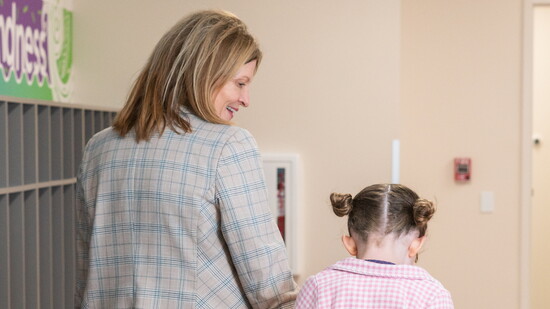By the time Molly and Erick Blenk contacted Springer Diagnostic Center, they already suspected that their daughter Fiona had dyslexia. The tipping point was when they saw their eight-year-old’s confidence taking a nosedive. With a short six weeks of help at the Center, Fiona had a diagnosis, a personalized action plan, a team of advocates and a smile on her face.
Under the leadership of Director Molly Bernosky, Springer Diagnostic Center opened in 2023 as a nonprofit offering psychoeducational evaluations for students, ages 5-18. The community’s need was clear—Springer fielded countless requests before the expansion.
“Springer decided we could broaden the scope of how we're servicing the community by adding the Diagnostic Center,” Bernosky says.
The center is adjacent to Springer School, but not a pipeline to it; their services are available for students in any school district.
“This process is all about meeting the individual needs of each family and child,” she explains.
While a traditional path to an ADHD or learning disability diagnosis can be long and winding, Springer offers a short wait for a collaborative, comprehensive diagnosis that’s all available under one roof. With a team of three psychologists that offer more than 45 years of combined experience, plus staff occupational therapists and speech-language pathologists, they are focused on creating a personalized plan for each family.
“You don't have to make separate appointments with the Department of Speech Language Pathology, then the Department of OT and then the Department of Psych. We’re a one-stop shop,” Bernosky says.
“Our assessments are multi-method, multi-source,” she adds. “They include standardized assessments, observations, rating scales and interviews. We get the child's voice, the parents’ voices, the school's voice—all the relevant people.”
After gathering this cross-section of information, they conduct testing sessions, followed by feedback meetings.
“From the initial consult to the feedback, it typically takes somewhere between four to seven weeks—we don't want you waiting forever to get results,” Bernosky explains.
The Center advocates for each child and will accompany families to school meetings to help relay the newfound information.
“It’s a lot of information—it can be like drinking water out of a fire hose to get this report about your child,” she says.
The Blenks were pleasantly surprised at how quickly they were able to get Fiona into Springer Center and felt heard and understood throughout the process.
“The whole Springer approach aligned with our philosophy as parents to want to understand our child as an individual and help her be the best version of that,” shares Erick Blenk.
“From other sources we might hear that there’s something ‘wrong’ with our kid,” agrees Molly Blenk, “but Molly [Bernosky] helped us learn about dyslexia, teaching us this is a great gift, that the way Fiona learns is super cool. With Springer’s help, we've learned the language of how dyslexia works.”
“Every child has individual, unique talents, and Springer is about discovering what they are,” Erick adds. “The sooner you understand what your child needs, the better opportunity you have to help them grow.”
Although they didn’t expect to, the Blenks transferred Fiona to Springer School. With a diagnosis and learning plan, Fiona’s bubbly spirit is back, and she is excited about school, an eager and curious learner.
“Springer has literally been a game changer for Fiona’s learning,” declares Molly Blenk.
“Art is my favorite!” Fiona chimes in with a confident smile.
Springer School and Center | 2121 Madison Road, Cincinnati | 513.871.6080 | Springer-LD.org
"The nonprofit Springer Diagnostic Center offers a short wait for a collaborative, comprehensive diagnosis that’s all available under one roof."
